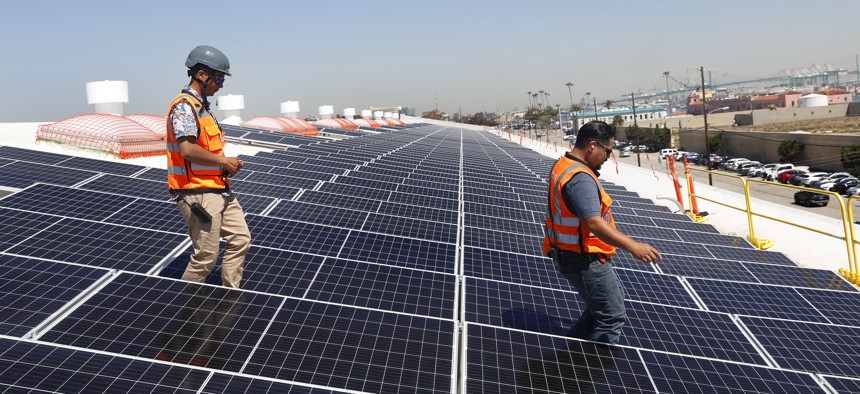Fighting Climate Change, State by State

Christina House / Los Angeles Times via Getty Images
COMMENTARY | Across the country, state and local governments are accelerating their efforts to cut greenhouse gas emissions. They are creating approaches that can be borrowed and improved upon.
Even as the U.N. Intergovernmental Panel on Climate Change called for more urgent action to reduce greenhouse gas emissions in its March report, the group also showed a path forward. “This report offers hope,” Hoesung Lee, chair of the IPCC, told reporters.
Indeed, despite the seriousness of the situation, there is reason to be hopeful, because day in and day out, state and local elected officials are bringing technology, innovation and urgency to address climate issues. Their progress is already making a difference, and, thanks to federal laws passed over the last two years our nation can make some of the concrete, lasting improvements the IPCC report calls for in the way we generate and consume energy. The Inflation Reduction Act, signed by President Joe Biden a year ago, is the “single largest investment in climate and energy in American history.”
At this critical time, there is an opportunity for state and local leaders to turbocharge and spread initiatives that are working across the country. States are the laboratories of democracy, and from those laboratories are coming promising practices that can be borrowed and improved upon by other states. Here are just a few examples:
Cities across the nation, including Milwaukee and Memphis, are investing in low- and no-emission vehicles to replace aging government vehicles. In Phoenix, Mayor Kate Gallego secured a $16.3 million grant to replace aging city buses with green, no- or low-emission battery electric & hydrogen fuel-cell buses. And thanks to the 2021 federal infrastructure law, roughly 400 applicants received funding from the Environmental Protection Agency to secure clean, zero-emission school buses to replace diesel-fueled ones.
In New Mexico, Albuquerque Mayor Tim Keller recently celebrated the opening of a 50-megawatt solar array. Along with other initiatives, the city’s government is on track to obtain nearly 90% of its electricity from solar.
Before becoming lieutenant governor of Massachusetts, then-Mayor Kim Driscoll secured millions in funding for offshore wind farm construction near the Salem Harbor Power plant. The project will create thousands of green jobs, and, when completed, will generate enough clean energy to power 750,000 homes annually.
New Bedford, Massachusetts, Mayor Jon Mitchell is also working toward making his city a national leader in offshore wind energy. He recently welcomed a state-led project to the area’s port to provide more than 1,500 megawatts of electricity by 2027.
At the state level, the Maryland General Assembly passed the Promoting Offshore Wind Energy Resources Act to facilitate the construction of wind energy transmission infrastructure.
In Michigan, the Whitmer-Gilchrist administration's MI Health Climate Plan release last year included a goal for economy-wide carbon neutrality by 2050, substantial increases in public transportation infrastructure and encouraging green innovation in the state's key industries.
And in California, state Sen. Ben Allen led the charge on a new law to reduce plastic packaging by 25 percent, as well as encourage the use of more sustainable options.
As more projects get off the ground, the moment calls for state and local policymakers to think big about climate solutions and take advantage of the chance to replicate what works.
U.N. reports are critical for laying out the facts. They are a reminder of the urgency of the situation, and that addressing the climate crisis is going to take concerted effort at all levels of government.
While the United States cannot solve this global challenge alone—there must be international cooperation—our country has a vital leadership role in showing the world how to act, and our history has proven that state and local leadership can set the course for our nation.
As President Biden had emphasized, “We’re the United States of America.There’s nothing, nothing, nothing beyond our capacity when we set our mind to it.”
Debbie Cox Bultan is CEO of NewDEAL, a selective national network of 200 state and local policymakers chosen for their forward-thinking, results-oriented approach to governing.
NEXT STORY: Louisiana’s Landmark Climate Adaptation Program Is Running Out of Time





